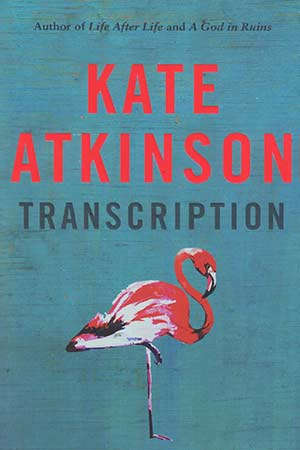
Kate Atkinson – Transcription
Kate Atkinson – Transcription
Transcription by Kate Atkinson
By James Ashmore (Read, Holmfirth)
In Kate Atkinson’s latest novel, set mostly during the second world, a young girl unwittingly finds herself at the centre of a British Intelligence operation to entrap and arrest Nazi sympathisers, Fifth Columnist sleeper agents across London, when she is deployed to transcribe the conversations of their clandestine meetings. Written like a spy thriller, but with all the breezy, fast-paced fun of her previous novels, Transcription holds many surprises in store for its readers.
 It’s 1981 and Juliet Armstrong is run over by a car in London while crossing the road. Lying on the tarmac, she remembers her post-war role at the BBC commissioning children’s programmes, and then goes further back to her MI5 secondment during the war. Recruited by the debonair Godfrey Toby, Juliet and a team of agents hole up in a flat in Dolphin Square next door to a heavily bugged honey trap. Here, Juliet is able to listen to the many incriminating conversations and type up exactly what they are saying. Interestingly, this is where Atkinson gets to play a few games, for how far can we trust the record that Armstrong is creating? Is she a reliable narrator? She is, after all, a spy dealing in the cross and the double-cross.
It’s 1981 and Juliet Armstrong is run over by a car in London while crossing the road. Lying on the tarmac, she remembers her post-war role at the BBC commissioning children’s programmes, and then goes further back to her MI5 secondment during the war. Recruited by the debonair Godfrey Toby, Juliet and a team of agents hole up in a flat in Dolphin Square next door to a heavily bugged honey trap. Here, Juliet is able to listen to the many incriminating conversations and type up exactly what they are saying. Interestingly, this is where Atkinson gets to play a few games, for how far can we trust the record that Armstrong is creating? Is she a reliable narrator? She is, after all, a spy dealing in the cross and the double-cross.
Armstrong is an excellent central character. As a reader, though, her initial innocence and brevity can be jarring, but there’s a spark, and possibly a mystery, within Armstrong that you just can’t help but like. Her role is to report dispassionately what she hears, but when she’s asked to play a more central role and work in the field she really comes into her own. Her mission to infiltrate the inner circle of the elderly Mrs Scaife, an unlikely villain but a nasty piece of work all the same, shows her aptitude for deception, while the eventual high-stakes spy games catch up with Juliet, revealing a ruthless streak.
As the novel moves on to the 1950s, Juliet is at the BBC surrounded, it seems, by characters from her old life (was the BBC really a post-war retirement home for spies?!), but has not yet been able to move on from her clandestine activities. Will one last mission, to provide safe passage to a Russian defector code-named Flamingo, be her undoing?
Atkinson is a hugely popular writer, and deservedly so. If you are looking for a heavy-weight spy novel in the form of, say, a Le Carre, look again. But if you like your thrillers to be fun and fast-paced, while still giving you a bit of work to do, then Transcription delivers.






